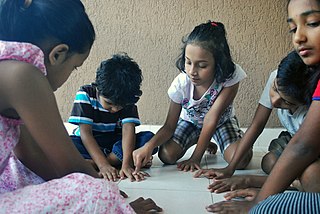
A counting-out game or counting-out rhyme is a simple method of 'randomly' selecting a person from a group, often used by children for the purpose of playing another game. It usually requires no materials, and is achieved with spoken words or hand gestures. The historian Henry Carrington Bolton suggested in his 1888 book Counting Out Rhymes of Children that the custom of counting out originated in the "superstitious practices of divination by lots."

Hangman is a guessing game for two or more players. One player thinks of a word, phrase, or sentence and the other(s) tries to guess it by suggesting letters or numbers within a certain number of guesses. Originally a paper-and-pencil game, there are now electronic versions.

Scrabble is a word game in which two to four players score points by placing tiles, each bearing a single letter, onto a game board divided into a 15×15 grid of squares. The tiles must form words that, in crossword fashion, read left to right in rows or downward in columns and are included in a standard dictionary or lexicon.
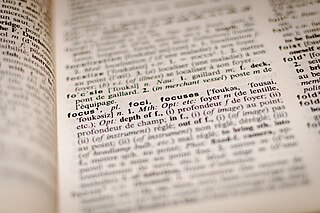
Fictionary, also known as the Dictionary Game or simply Dictionary, is a word game in which players guess the definition of an obscure word. Each round consists of one player selecting and announcing a word from the dictionary, and other players composing a fake definition for it. The definitions, as well as the correct definition, are collected blindly by the selector and read aloud, and players vote on which definition they believe to be correct. Points are awarded for correct guesses, and for having a fake definition guessed by another player.
Balderdash is a board game variant of a classic parlour game known as Fictionary or the Dictionary Game. It was created by Laura Robinson and Paul Toyne of Toronto, Ontario, Canada. The game was first released in 1984 under Canada Games. It was later picked up by a U.S company, The Games Gang, and eventually became the property of Hasbro and finally Mattel. The game has sold over 15 million copies worldwide to date. It is aimed at fans of word games, such as Scrabble.

Boggle is a word game in which players try to find as many words as they can from a grid of lettered dice, within a set time limit. It was invented by Allan Turoff and originally distributed by Parker Brothers.

In the United States and Canada, bingo is a game of chance in which each player matches the numbers printed in different arrangements on cards. The game host draws balls at random, marking the selected numbers with tiles. When a player finds that the selected numbers are arranged on their card in a horizontal, vertical, or diagonal line, they call out "Bingo!" to alert all participants to a winning card, which prompts the game host to examine the card for verification of the win. Players compete against one another to be the first to have a winning arrangement for the prize or jackpot. After a winner is declared, the players clear their number cards of the tiles and the game host begins a new round of play.

Pig is a simple, collecting card game of early 20th century American origin suitable for three to thirteen players that is played with a 52-card French-suited pack. It has two very similar and well known variants – Donkey and Spoons. It is often classed as a children's game. It may be descended from an old game called Vive l'Amour.

Jotto is a code-breaking pen and paper word game for two players. Each player picks and writes down a secret word and attempts to guess the other's word first during their turn.
A word salad is a "confused or unintelligible mixture of seemingly random words and phrases", most often used to describe a symptom of a neurological or mental disorder. The name schizophasia is used in particular to describe the confused language that may be evident in schizophrenia. The words may or may not be grammatically correct, but they are semantically confused to the point that the listener cannot extract any meaning from them. The term is often used in psychiatry as well as in theoretical linguistics to describe a type of grammatical acceptability judgement by native speakers, and in computer programming to describe textual randomization.
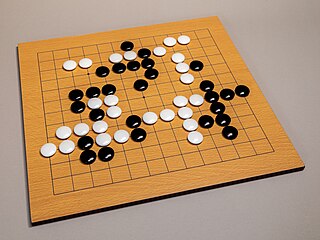
An abstract strategy game is a type of strategy game that has minimal or no narrative theme, an outcome determined only by player choice, and in which each player has perfect information about the game. For example, Go is a pure abstract strategy game since it fulfills all three criteria; chess and related games are nearly so but feature a recognizable theme of ancient warfare; and Stratego is borderline since it is deterministic, loosely based on 19th-century Napoleonic warfare, and features concealed information.

Catch Phrase is a word guessing party game commercially available from Hasbro.
MASH is a multiplayer paper-and-pencil game commonly played by children intended to predict one's future. The name is an acronym of "Mansion, Apartment, Shack/Street/Shed/Sewers/Swamp, and House". Additional variations include adding a potential car, future spouse, and ultimate career choice, among the numerous other possible categories.
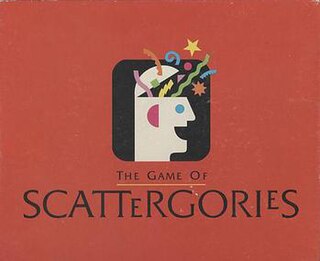
Scattergories is a creative-thinking category-based party game originally published by Parker Brothers in 1988. Parker Brothers was purchased by Hasbro a few years later, which published the game internationally under its Milton Bradley brand. The objective of the 2-to-6-player game is to score points by uniquely naming objects within a set of categories, given an initial letter, within a time limit. The game is based on a traditional game called "Categories".
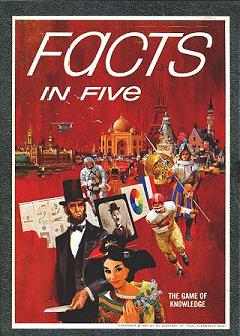
Facts in Five: The Game of Knowledge is a trivia game for two or more players, designed in 1964 by Rick Onanian.

A game is a structured form of play, usually undertaken for entertainment or fun, and sometimes used as an educational tool. Many games are also considered to be work or art.
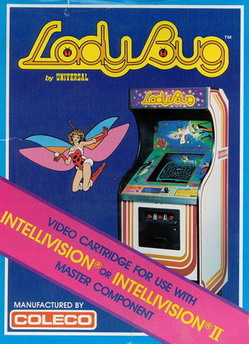
Lady Bug is a maze chase video game produced by Universal and released for arcades in 1981. Its gameplay is similar to Pac-Man, with the primary addition to the formula being gates that change the layout of the maze when used, adding an element of strategy to the genre. The arcade original was relatively obscure, but the game found wider recognition and success as a launch title for the ColecoVision console.

Scrabble Showdown is an American game show created for the American cable network The Hub. The program was based on the board game Scrabble and was hosted by Justin Willman. It ran from September 3, 2011, to April 15, 2012.
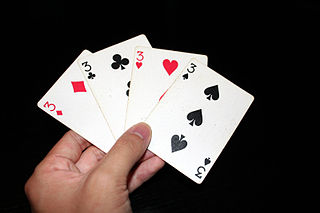
Kemps is a matching card game for two to six teams of two players each, where each player must secretly communicate to their partner when they have four matching cards in their hand. The game is a "cross between Commerce and Authors" with the unusual feature of partnership play. This "party classic" is also known as Canes, Cash and Kent. It appears to be a 21st century game played in America, France and Switzerland (known there as Gemsch or Gämsch, but its origin is unclear.

















